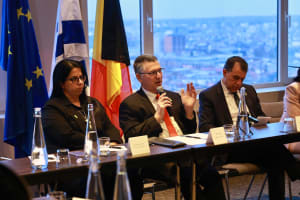The perfect puppet master: How Qatar pulls the strings of both terror and Western democracies

As Trump's return to power becomes a vivid reality, a revealing drama is being played out on the global stage. First came reports, sourced to senior Biden administration officials, that Qatar would expel Hamas leadership from Doha. Within hours, Qatar's Foreign Ministry contradicted these claims, insisting Hamas's office would remain open as "a channel of communication." This wasn't diplomatic confusion - it was a masterclass in Qatar's sophisticated influence operations, demonstrating exactly why this tiny Gulf state represents such a unique challenge to Western interests.
Qatar's relationship with Hamas isn't casual or recent - it's deep and calculated. When Sheikh Hamad, father of the current emir, became the first world leader to visit Gaza after Hamas's violent takeover in 2007, he didn't just offer diplomatic recognition - he pledged $400 million in support. Since then, Qatar has channeled an estimated $1.8 billion to Hamas-controlled Gaza, with $360 million in annual support pledged as recently as January 2021.
Yet today, as Trump promises crackdowns on universities supporting antisemitism, Qatar appears to be distancing itself from Hamas. This isn't a contradiction - it's strategy. And while attention focuses on this public repositioning, a far more concerning reality remains: Qatar has systematically flooded America's intellectual institutions with petrodollar influence that runs deeper than any political swamp.
The education empire: Creating dependencies
While Qatar publicly recalibrates its Hamas relationship, its vast academic influence network remains not only intact but largely unexamined. The same sovereign wealth fund that enables Hamas leaders like Ismail Haniyeh and Khaled Mashal to live in five-star Doha hotels (where they've reportedly amassed fortunes exceeding $4 billion each) continues funding academic centers across America's most prestigious universities.
Qatar has become the largest foreign donor to American universities, with documented donations reaching $4.7 billion between 2001-2021. Yale University's case proves particularly revealing: while officially reporting only $284,668 in Qatari funding between 2012-2023, the actual amount exceeded $15,925,711 - demonstrating both Qatar's sophisticated approach to obscuring its full influence and these institutions' growing dependency on Gulf money.
The perfect convergence: Building the ecosystem
Qatar's mastery lies not just in controlling multiple narrative channels but in creating an ecosystem of dependency. Consider Al Jazeera, Qatar's state-owned media giant. While the network has openly broadcast Hamas military chief Mohammad Deif's call to arms and aired Ismail Haniyeh praising October 7 as a "great triumph," it simultaneously maintains its credibility in Western academic circles. The same network that for years hosted Muslim Brotherhood cleric Yusuf Qaradawi, who endorsed suicide bombings, is regularly cited in Western university courses.
This isn't just influence - it's institutional capture through financial addiction.
The Trump factor: Strategic adaptation
Qatar's recent suspension of mediation efforts with Hamas reveals the puppet master's sophisticated understanding of Western politics. Trump explicitly promised to:
- Raise endowment taxes from 1.4% to 35% for universities with endowments over $10 billion
- Monitor universities for civil rights violations with penalties up to entire endowment forfeiture
- Slash federal education funding by more than half
- Reform accreditation to combat what he terms "wokeness"
Qatar demonstrates why it's such a formidable actor: the ability to appear to retreat while maintaining or even strengthening the addictive relationships it has built with Western institutions.
The American paradox: The cost of dependency
Qatar's sophisticated balancing act is perhaps best exemplified by its relationship with the United States. While hosting approximately 10,000 U.S. troops and CENTCOM Forward Headquarters at Al-Udeid Air Base, Qatar simultaneously harbors Hamas' political office (opened in 2012) and provides luxury accommodation to its leadership. The same country that serves as a major non-NATO ally actively blocks U.S. legislation recognizing it as a Hamas financier.
This relationship exemplifies the challenge: Qatar has made itself seemingly indispensable across multiple domains while using that perceived indispensability to deepen its influence.
The master strategy: Creating the perfect swamp
Unlike Iran's rigid opposition or Saudi Arabia's overt alignments, Qatar's power lies in creating sophisticated networks of dependency that resist traditional countermeasures. When Saudi Arabia, the UAE, Bahrain, and Egypt severed ties with Qatar in 2017 over its support for terrorism, Qatar didn't abandon its strategy - it demonstrated how deeply entrenched its influence had become.
Consider the timeline: On October 7, Qatar's foreign ministry released a statement holding "Israel alone responsible" for Hamas's attack. By November, as scrutiny increased and Trump's promises loomed, Qatar began signaling distance from Hamas. Yet throughout this period, its academic funding, media operations, and influence networks remained intact - a testament to how effectively it has created its own swamp in Western academia.
The real swamp: Beyond Washington's Beltway
When we speak of "draining the swamp," the image typically conjured is of Washington insiders - career bureaucrats and political elites perpetuating their own power. Yet perhaps the most dangerous swamp isn't in Washington's Beltway at all - it's the vast reservoir of Qatari oil money systematically flooding America's intellectual institutions.
This petrodollar swamp runs deeper and wider than any political morass. While bureaucrats come and go with administrations, Qatar has built a permanent infrastructure of influence within the most prestigious universities, think tanks, and cultural institutions. This isn't just about money changing hands - it's about minds being shaped, narratives being controlled, and future leaders being influenced at their most formative stages.
The challenge of withdrawal
Any attempt to drain this academic-influence swamp will face significant challenges. Like any addiction, the withdrawal symptoms will be severe:
- Universities have become dependent on Qatari funding for research programs and centers
- Academic careers have been built around Qatar-funded initiatives
- Entire departments and programs rely on this Gulf state's patronage
- Cultural institutions have grown accustomed to Qatari sponsorship
Yet the cost of not addressing this dependency is far greater. While Iran's nuclear program draws headlines and Saudi influence receives scrutiny, Qatar's subtle colonization of Western academia continues largely unchallenged. The puppet master keeps pulling strings, and the dance goes on.
A new understanding of the threat
Qatar's current moves regarding Hamas don't contradict their danger to Western interests - they prove it. When the same entity can simultaneously "distance" itself from Hamas while maintaining its grip on Western academia, we're not seeing a contradiction. We're seeing mastery of influence operations that makes traditional foreign influence look crude by comparison.
Qatar's success lies not in hiding its influence but in making it appear normal and necessary - just another stream of academic funding, just another diplomatic relationship, just another strategic alliance. Their sophisticated response to potential political shifts - appearing to distance from Hamas while maintaining their grip on Western institutions - demonstrates why traditional approaches to foreign influence fall short.
Seeing through the show
As a new administration potentially takes shape with promises to "drain the swamp," the question becomes whether America has the will to address not just the visible waters of Washington politics, but the deeper currents of foreign influence running through our most prestigious institutions. The real swamp isn't just in D.C. - it's in the Qatar-funded centers, programs, and initiatives that shape how the next generation of American leaders understands the world.
The puppet master's greatest trick isn't hiding the strings - it's convincing us that cutting them would hurt us more than them. Until we recognize that the short-term pain of financial withdrawal pales compared to the long-term threat of intellectual capture, Qatar will continue its sophisticated game of apparent retreat and actual advance.
The time has come to ask: How much longer will we allow foreign oil money to shape American minds?

Tolik is a Middle East analyst and media professional with extensive experience in covering regional geopolitical developments. His background spans analytical journalism, media production, and strategic communications, having contributed to major Israeli and international television networks and newspapers.













